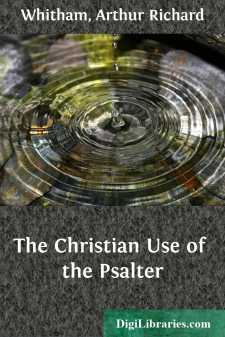Categories
- Antiques & Collectibles 13
- Architecture 36
- Art 48
- Bibles 22
- Biography & Autobiography 813
- Body, Mind & Spirit 142
- Business & Economics 28
- Children's Books 17
- Children's Fiction 14
- Computers 4
- Cooking 94
- Crafts & Hobbies 4
- Drama 346
- Education 46
- Family & Relationships 57
- Fiction 11829
- Games 19
- Gardening 17
- Health & Fitness 34
- History 1377
- House & Home 1
- Humor 147
- Juvenile Fiction 1873
- Juvenile Nonfiction 202
- Language Arts & Disciplines 88
- Law 16
- Literary Collections 686
- Literary Criticism 179
- Mathematics 13
- Medical 41
- Music 40
- Nature 179
- Non-Classifiable 1768
- Performing Arts 7
- Periodicals 1453
- Philosophy 64
- Photography 2
- Poetry 896
- Political Science 203
- Psychology 42
- Reference 154
- Religion 513
- Science 126
- Self-Help 84
- Social Science 81
- Sports & Recreation 34
- Study Aids 3
- Technology & Engineering 59
- Transportation 23
- Travel 463
- True Crime 29
The Christian Use of the Psalter
Description:
Excerpt
LECTURE I
PART I. GENERAL PRINCIPLES
Haereditate acquisivi testimonia tua in aeternum:
Quia exsultatio cordis mei sunt.
The Christian use of the Psalter is as old as Christianity itself. The new-born Catholic Church, returning from her earliest conflict with the kingdoms of this world, found the most natural expression of her faith and her need in the words of the 2nd Psalm:
Why did the Gentiles rage,
And the peoples imagine vain things?
The kings of the earth set themselves in array,
And the rulers were gathered together,
Against the Lord, and against His Anointed.
(Acts iv. 25, 26, R.V.)
Before this, on the very birthday of the Church, the chief of the Apostles had appealed to the witness of "David," for the Resurrection and Triumph of the Holy One (Pss. xvi., cx. in Acts ii. 25-8, 34, 35). And even earlier, during the ten days of waiting, the great Psalms of righteous wrath (thought so impossible by many to-day) had supplied the prophecy of the fall of Judas:
Let his habitation be made desolate,
And let no man dwell therein;
and the justification of the election of Matthias:
His office let another take.
(Pss. lxix. and cix. in Acts i. 20.)
So harmoniously did the praise-book of the Jewish Church pass into the service of Christ; so clearly did the first believers recognise that the Spirit of Christ was the same Who had spoken by "David." This immediate appropriation of the Psalter as a book of Christian witness is remarkable evidence to the felt unity and continuity of the two Covenants. No book of the Old Testament, with the exception of Isaiah, is so frequently quoted in the New as the book of Psalms.
But still more remarkable is the influence of the Psalter on Christian worship. The Church exists in the world not only as the teaching, but also as the worshipping community. As the ages pass she ceases not to bear the witness of her praise and thanksgiving to the Father, the Son, and the Holy Ghost. From the beginning she showed a tendency to do this in ordered and liturgical forms. The Apostolic Church continued steadfast in "the prayers" (Acts ii. 42, R.V.). The expression implies not merely a daily gathering for worship, but the offering of that worship in a fixed and orderly manner, suggested, no doubt, by the existing Jewish services. Whatever may have been the actual form of "the prayers" in the first age of the Church, or whatever stages they may have passed through, there can be no doubt that they are the germ of all the rich later developments of the liturgy of the Church, such as are represented in the Middle Ages by the Missal and the Breviary, and to-day by our own Book of Common Prayer.
The regular services of the Church fall naturally into two classes. The Eucharist, the service of the Altar, took the place of the sacrificial worship of the Temple. The Divine Office, the service of the Choir, may have been suggested by the services of the Synagogue. But if so, there is one most significant difference. The Christian Church made a much fuller public use of the Psalms than the Synagogue ever seems to have done.[] The Psalms in the Jewish Church seem to have been adjuncts or embellishments of the service, rather than its central feature....


